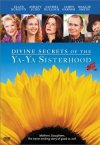BUY THE DVD:
|


|
|
|
SYNOPSIS:
| |
a group of lifelong friends stages a rather unorthodox intervention to help a young playwright unravel the truth about her eccentric mother, find forgiveness and come to terms with her difficult past.
|
|
|
MOVIE FACT:
| |
the last movie bullock and judd starred in, a time to kill, was a big money-makers and helped to establish both as box-office stars.
|
|
|
RATING:
|


two out of four possible stars
|
|
|
|
This film has a lot of characters in it and not a lot of character. Sure, there are a few "sweet" moments littered throughout the movie, but this film doesn't have a lot of direction otherwise. There are many times in this film that will have the audience wondering why that specific scene was included in the film. As with any novel to screen adaptation, one of the decisions that the screenwriter and director have to make is what to include and what to leave out of the original story. It seems that much of what was included from the novel was picked simply because it would transfer well to the screen. But in looking at the larger picture, there are too many instances where this film just stops in its tracks in favor of displaying some sort of sweet scene with one of the myriad characters floating about in any one of a dozen decades. There are at least twelve actresses playing three characters and keeping them apart is a job in itself.
There is much to "keep up with" over the course of this movie's two hours and the screenwriter (and perhaps the editor) did not make it any easier for the audience when they decided to leave out the histories of some of the characters. Not everyone in this film has their story explained to the audience and because of that, some of the characters are just a mystery. By the end of the film, "Sidda," played by Sandra Bullock, who is at war with her mother, "Vivi," played by Ellen Burstyn, are the only characters the audience has any information about. And given that the other characters in the film are in the very least, interesting, it seems impossible that this film lasts for two hours and only two of these women's lives are examined.
And given that Maggie Smith plays one of these ladies, it seems a crime that her story isn't one that's presented to the audience. The most viewers learn about Smith's character, "Caro," is that she married a gay many and didn't learn about his sexual preferences until they'd been married for twenty-six years. Now, this in and of itself seems like a wonderful jumping off point for a few scenes detailing Caro's life. But it's hard to discern which actress is even playing Caro during the parts of the story where her character is in her twenties and an adolescent. But although Smith's character doesn't get enough screen time, Smith herself still manages to steal every scene she's in. Like she does in every film in which she graces her presence.
Ashley Judd also makes quite an impression in each of her scenes. Judd plays the younger version of "Vivi," Ellen Burstyn's character, and helps to propel the film along whenever she's on the screen. The film has many moments of dead airtime, making its two hours seem somewhat longer, but as with Maggie Smith's performance, Judd gets the movie jumping, if only for the few moments she's on the screen. But itís hard to fall in love (or at least be entertained by) so many different characters in one film when their individual stories aren't told. Dozens of actresses play so many people in this film and it's not so easy to care about their problems. And that is one of the fundamental problems with this film. If the stories told in the film aren't enough to get the audience interested in these women's lives, getting to the end of the film becomes more of a chore than an enjoyment.
The genre of melodrama has been around since filmmakers first started making fictional movies. Probably for at least a hundred years by now, and the genre has been treated to the many generational story of a group of women more successfully in other films. Fried Green Tomatoes is a prime example of a film that moves back and forth through time dealing with two completely separate groups of people, yet still manages to tell the stories of each of those characters with a fluid pace and a minimum of flat spots. How to Make an American Quilt, though not as expertly made, is also an example of a movie which clocks in at no more than two hours but still makes its audience sympathize with its characters. Divine Secrets of the Ya-ya Sisterhood just takes too long to tell too little.
It seems a waste of talent to include such a talented cast in two hours of what is essentially no more than a series of vignettes designed to elicit a series of "ain't that cute" sentiments in the viewer. Who's probably most at fault here is the person who originally decided that the book this film's based upon would turn into a good film. Or it might have been the screenwriter who attempted to adapt what was certainly a book with too many characters in too many situations. Or it might have been the director's fault. Callie Khouri, who wrote the groundbreaking screenplay to Thelma and Louise, didn't drop the ball on this one, but she certainly couldn't keep it rolling for the entire film. Ya-ya has a few heartwarming moments, and even some well-placed humor, but there are an equal amount of uninteresting places perfectly suitable during which nodding off for a quick nap would be an excellent idea.
Review by Kelsey Wyatt.
| |
|